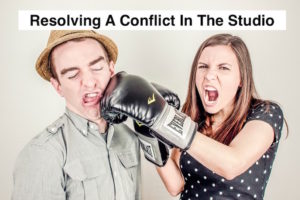- in Book Excerpt , Production by Bobby Owsinski
Resolving A Conflict In The Studio
 It’s inevitable that it’s going to happen during some point in the project. There’s going to be a strong disagreement between two of the parties involved, and the producer is going to have to diplomatically sort it out. Even worse, the conflict can come between the artist and the producer, which requires a deft hand at getting the job done yet keeping everyone happy. Here’s an excerpt from the latest version of my Music Producer’s Handbook that covers the steps to take when it comes to resolving a conflict in the studio.
It’s inevitable that it’s going to happen during some point in the project. There’s going to be a strong disagreement between two of the parties involved, and the producer is going to have to diplomatically sort it out. Even worse, the conflict can come between the artist and the producer, which requires a deft hand at getting the job done yet keeping everyone happy. Here’s an excerpt from the latest version of my Music Producer’s Handbook that covers the steps to take when it comes to resolving a conflict in the studio.
“Being in any relationship requires at least some compromise, and working with a group of musicians is no different from what you’d expect between family members, friends, bosses, and co-workers. There are times when you just have to bend in order to keep the peace.
While compromise is easy for some people to do, others have a personality that seldom allows it and a conflict occurs. Here are some effective steps that you can take to state your case in a way that should resolve or mediate the conflict.
1. Cool off first. Conflicts can’t be solved when emotions are running hot. Take some time to get away from the problem for a bit and brainstorm on exactly what the conflict is, how it was caused, and most important, what a possible solution would be.
2. Present accolades, support, and respect. The first thing to do is acknowledge the person’s accomplishments and talent. Something like “I want to start by saying that I think the tracks we’ve captured are really great, and you’re playing your parts way better than I ever thought possible.”
3. Analyze why the problem occurred. If you give a clear explanation of why you think there’s a problem or why the problem or conflict has occurred, you set the initial groundwork for solving the conflict. If the other person knows exactly what your side of the story is, you might find more often than not that you’re both on the same page, but on different sides of it.
4. Take responsibility and use “I” messages. If you are involved in a conflict that you’re aware of, take responsibility and own up to it, but make sure that everything is from your point of view. For instance, it’s best to say, “I think you were flat on that part,” rather than “Everybody knows that you always sing that part flat,” or worse, “You’re singing sucks, man.”
5. Describe what “I” or “we” need so that the problem doesn’t happen again. This is the solution from your point of view. “We really need you to be here a half hour before the session so that you have time to warm up. That way we won’t waste any studio time, which is costing us money.”
6. Support their success. Tell him that you want him to win, because if he wins, so do you. “The better you sound, the better we all sound” or “Do you know how great this is going to sound once you get that part down? It’s going to kill!”
You can read more from The Music Producer’s Handbook and my other books on the excerpt section of bobbyowsinski.com.

